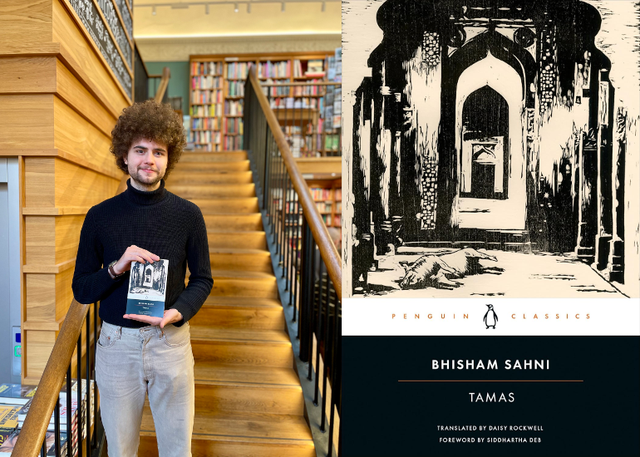World Literature Reading Group
Sunday 11th January 2026
The Library at The Raven, 7 Queen St, Bath BA1 1HE
6.30pm
7pm

Our World Literature Reading Group aims to showcase literature written outside of the anglophone world. On our journey we will make a variety of stops in Asia, Africa, the Middle East, the Caribbean, Latin America, and Oceania, tracking down the masterpieces that have otherwise been overlooked. In this seventh group, we will discuss Bhisham Sahni’s Tamas.
In a city in undivided Punjab, Nathu, a tanner, is bribed to kill a pig. When the animal’s carcass is discovered on the steps of the local mosque the next morning, brewing tensions explode into riots and massacre. A seemingly well planned and executed job by the British plants seeds of mistrust and hatred among those who, until the day before, had been close friends and neighbours.
“Tamas by Bhisham Sahni is a text dealing with India’s partition, yet it is not exactly about partition. [It] is an accurate, fearless, and gripping account of the divided and the uncertain times we Indians have gone through. He won the ‘Sahitya Academi’ for Tamas in 1975 and it was subsequently adapted into a National Award Winning film by Govind Nihalani. The novel is considered an outstanding contribution to Hindi Literature. [...] [It] is poignant and real. Full credit goes to the writer to justify the topic in [the] best possible manner.” (Yuvraj Trivedi, South Asian Journal)
“Sahni himself was compelled to write Tamas nearly three decades after the Partition, channeling his memories of the time into the present-day outrage about ongoing violence against Muslims in Hindu-dominated India. [...] Almost a century from Partition, India under the right-wing leadership of Narenda Modi and his Hindu nationalist party is a place of unrelenting war against its minorities and its marginalised. Even as Europe and the United States remain in thrall to Modi for his embrace of shiny capitalism exemplified by massive airports and ostentatious oligarchs, Indian Muslims suffer from lynchings, imprisonment, torture, and discrimination in almost every walk of life. [...] Sahni’s novel [also] channels his own anger against what he saw as the failed postcolonial project of an India that would be more equitable, generous, and diverse than the subcontinent of famines and inequality - the average life expectancy was twenty-six when the British departed - left in ruins by Western colonialism.” (Daisy Rockwell, ‘Translator’s Introduction’ in Tamas)